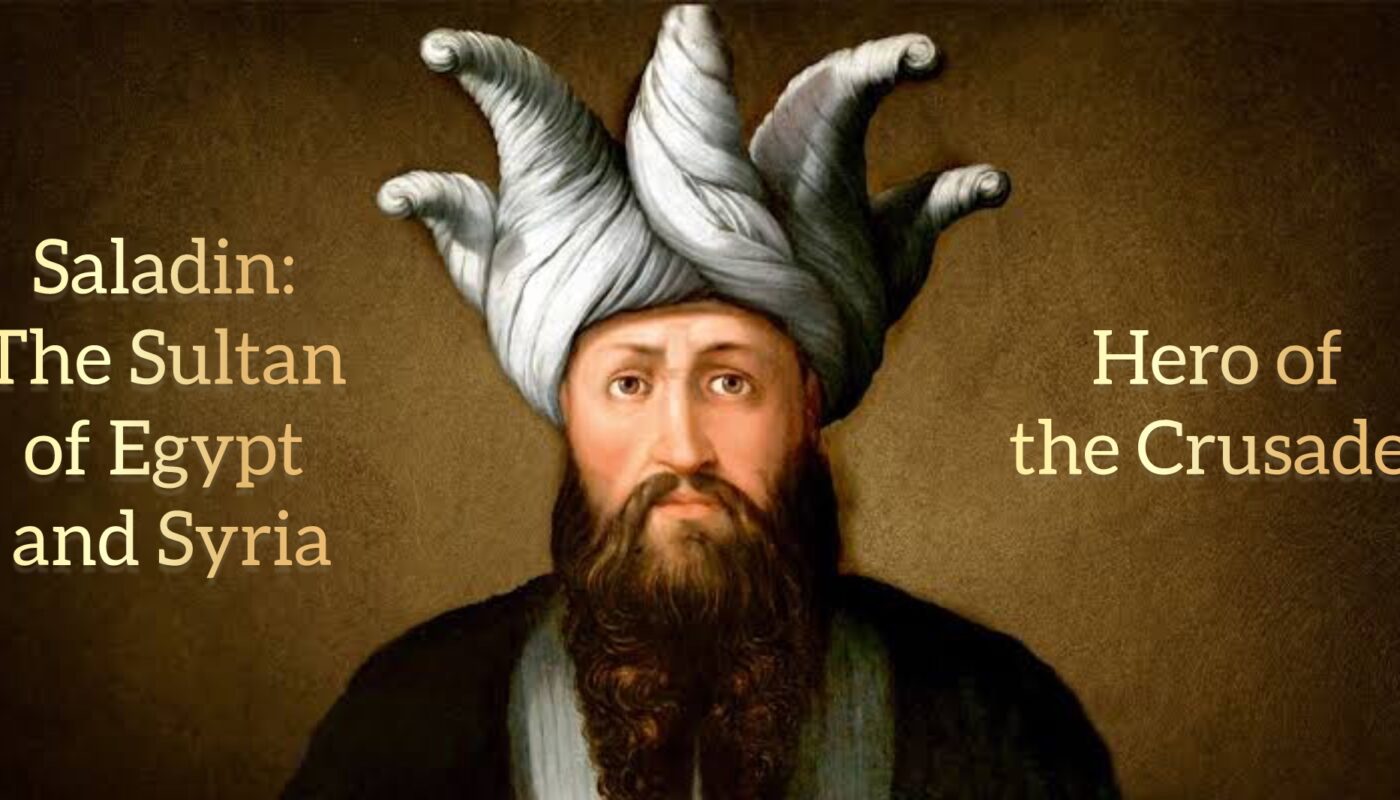Introduction
Saladin (1137–1193 CE), known in Arabic as Salah ad-Din Yusuf ibn Ayyub, is one of the most iconic figures in medieval history, especially renowned for his role in the Crusades and his leadership during the Third Crusade. As the founder of the Ayyubid dynasty, Saladin became the Sultan of Egypt, Syria, and parts of Mesopotamia. His military brilliance, statesmanship, and deep sense of honor, justice, and compassion have made him a hero in both the Muslim and Western traditions. Saladin is most celebrated for his recapture of Jerusalem in 1187, which was one of the defining moments of the Crusades.
Early Life and Background
Saladin was born in 1137 CE in the town of Tikrit (modern-day Iraq), to a Kurdish family that had long been involved in military service. His father, Ayyub ibn Shadhi, was a prominent military officer, and his family had ties to the Zengid dynasty in Syria. Saladin’s lineage was rooted in the Kurdish tribes of Northern Iraq and Western Iran, who had converted to Islam after the Arab expansion.
Education and Early Career
Saladin received a rigorous education, including training in military tactics, administration, and Islamic scholarship. He grew up in the court of Nur ad-Din, the powerful Zengid ruler of Syria, where his skills were recognized early on. At a young age, Saladin began his career in the military, gaining experience as a soldier and leader. He quickly became known for his courage, strategic thinking, and leadership.
Saladin’s Rise to Power
Saladin’s ascent to power began through his association with Nur ad-Din, who ruled a vast portion of the Muslim world, including parts of Syria and Iraq. Nur ad-Din had his own ambitions to unify the Muslim world against the Crusaders and to recover lands taken by the Latin Crusader States, which had established several strongholds in the Levant after the First Crusade.
Governor of Egypt
In 1169, Saladin was appointed as the vizier of Egypt under the Fatimid Caliphate, which at the time was weakened and on the verge of collapse. Although the Fatimids were Shi’ite Muslims, Saladin was a Sunni, and he sought to restore the Sunni orthodoxy in Egypt. He initially served as a loyal vassal to Nur ad-Din, but over time, Saladin grew in power.
By 1171, after a series of political machinations and military actions, Saladin managed to oust the last Fatimid caliph and effectively took control of Egypt. He then declared his allegiance to the Abbassid Caliphate in Baghdad, which solidified his Sunni credentials and expanded his influence in the broader Islamic world.
The Crusader States and the Prelude to the Battle of Hattin
Saladin’s vision was not just to hold Egypt but to unite the Muslim lands and push back against the encroaching Crusader States in the Holy Land. His military career during this time was focused on reclaiming territories lost to the Crusaders and consolidating his power.
Unification of Muslim Lands
By 1174, Saladin had consolidated control over Syria and Mesopotamia through a series of successful military campaigns. His forces captured key cities such as Damascus, Aleppo, and Homs, effectively unifying much of the Levant under his rule. This made Saladin a powerful and respected leader across the Muslim world.
Saladin’s consolidation of power made him the undisputed leader of the Ayyubid dynasty, which would rule over much of Egypt, Syria, and the Levant for several generations. He sought to build an Islamic coalition capable of taking on the Crusaders and bringing the Holy Land back under Muslim control.
Tensions with the Crusaders
By this time, the Crusader States—including the Kingdom of Jerusalem, the County of Tripoli, and the Principality of Antioch—were deeply entrenched in the Levant. Tensions between the Crusaders and Saladin’s forces had been escalating for years, particularly after the Treaty of Jerusalem (1180), which temporarily maintained peace but left underlying conflicts unresolved. The Crusader rulers were constantly at odds with Saladin, especially over the control of Jerusalem.
The Battle of Hattin (1187) and the Fall of Jerusalem
The Battle of Hattin
In 1187, Saladin launched a decisive military campaign to recapture Jerusalem, which had been under Christian control since the First Crusade. The Crusader Kingdom of Jerusalem, led by Guy of Lusignan, was a fragmented state, and Saladin saw an opportunity to strike a decisive blow.
The pivotal moment came in July 1187, when Saladin’s forces defeated the Crusader army at the Battle of Hattin, near the Sea of Galilee. The Crusaders were surrounded, and many of their leaders, including King Guy of Lusignan and Raymond of Tripoli, were captured. The loss at Hattin was catastrophic for the Crusaders.
The Siege of Jerusalem
Following the victory at Hattin, Saladin marched towards Jerusalem, which was under the control of the Crusaders. The city was fortified and defended by Balian of Ibelin, one of the leading Christian knights. Saladin laid siege to the city, which endured several weeks of relentless pressure.
On October 2, 1187, after intense negotiations and promises of safe passage for the Christian inhabitants, Jerusalem surrendered to Saladin. The Muslim forces entered the city, and Saladin’s forces took control of the Al-Aqsa Mosque and the Dome of the Rock. However, Saladin’s conduct was marked by mercy: although Jerusalem had been an important Christian city, he allowed Christian pilgrims to leave safely and ensured that the Christian population was not harmed.
Symbol of Chivalry and Honor
Saladin’s treatment of Jerusalem’s Christian population during the conquest is often highlighted as a reflection of his deep sense of honor and chivalry. Unlike the Crusaders, who had massacred Muslims and Jews during their conquest of the city in 1099, Saladin showed restraint and respect for both Christians and Jews.
The Third Crusade and Saladin’s Legacy
The Crusade Against Saladin
The fall of Jerusalem prompted the launching of the Third Crusade (1189–1192), led by three of Europe’s most powerful monarchs: Richard the Lionheart of England, Philip II of France, and the Holy Roman Emperor Frederick I Barbarossa.
Although Saladin’s forces were able to hold off the Crusaders from retaking Jerusalem, the Crusaders made significant military gains, especially in the coastal cities. Saladin’s forces engaged the Crusaders in a number of battles, including the Battle of Arsuf in 1191, where Richard the Lionheart dealt Saladin a tactical defeat. However, despite these setbacks, Saladin remained resolute in his mission to defend Jerusalem.
A Negotiated Peace
After years of fighting, Saladin and Richard the Lionheart eventually reached a peace agreement in 1192, which allowed Christian pilgrims to visit Jerusalem and guaranteed Muslim control over the city. The treaty marked the end of the Third Crusade but did not return Jerusalem to the Crusaders. The city remained under Muslim control.
Death and Legacy
Saladin died on March 4, 1193, at the age of 55, after a long and successful reign. His death left a power vacuum, but his descendants, the Ayyubids, continued to rule much of the region for several decades.
Legacy as a Hero
Saladin’s legacy is multifaceted:
-
In the Muslim World: Saladin is considered a hero and a symbol of Islamic unity and chivalric values. His ability to unite the Muslim world and his efforts to reclaim Jerusalem are central to his status as a beloved historical figure.
-
In the West: In the Western world, Saladin is often admired for his honor, integrity, and respect for his adversaries. His conduct during the Crusades, particularly during the fall of Jerusalem, has been celebrated in literature, poetry, and later historical writings.
-
As a Military Leader: Saladin was a master of guerrilla tactics, siege warfare, and diplomacy. His ability to unite a fragmented region and lead it to victory against much larger forces is a testament to his leadership and strategic brilliance.
Conclusion
Saladin remains one of the most admired figures in world history. A brilliant strategist, a compassionate ruler, and a man of deep Islamic faith, his legacy continues to resonate in both the Muslim and Christian traditions. His life story, full of political intrigue, military victories, and remarkable acts of mercy, has made him a hero for centuries. His impact on the Crusades, the Muslim world, and the broader history of the Middle East remains profound.



